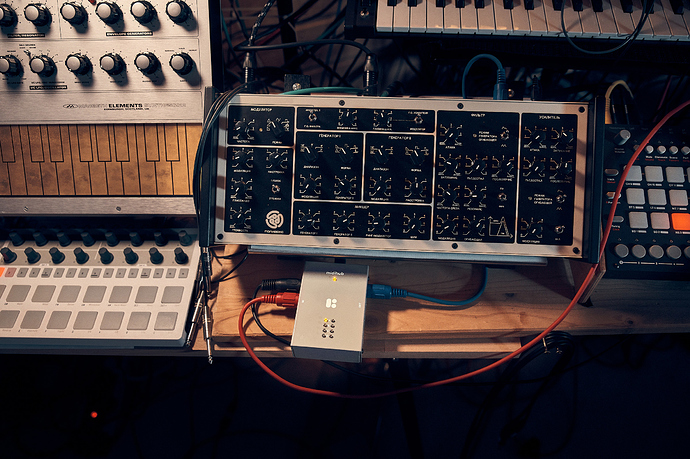MidiHub review
Overview
Midihub is a midiutility offering a plethora of possible applications in a flexible way.
It’s a solid build metal box with
4 Midi In /Out
1 USB for power, editor, and 4 other USB-Midi-Ports
The MidiHub Editor is available for Win, macOs & Linux wich makes it accessible for every musician with a computer.
The basic use cases are midi-merger, splitter and 4x midi-interface.
Via the editor currently the following utilities are available:
Transpose
Filter
Note Remap
Channel Remap
Velocity Amp
Tempo Divider
Sync Delay
General:
The device looks solid hand build in a modern , simple elegant design.
It’s an extremly useful and versatile device. For me the best use case as a general midi-interface on the road. It’s small and can be any midi tool I need.
A big plus is the midi-filter, as I have some synths with a bit picky midi interfaces that tend to crash if they are getting feed with to much information at a time.
Also very useful can be modules like the channel-remap or transpose.
There are synths that don’t have adjustable midi-receive channels or different synths and sequencers use different midi-base notes . For some middle C is C4 for other C3. This can be easily fixed with midihub.
The transpose can be very handy working with certain sequencers as for example the Elektron Digitakt that doesn’t offer transposition after the sequence has been entered.
You can also build more fancy tools like a chord-generator, but this is not so interesting for me as I have better tools for this.
The software-editor is easy to use and quite logical.
Things to improve:
The overall midi latency when used as a usb-midiinterface is a bit high
The current hardware has no midi ports printed on, wich lead several time to confusion.
The software is sometimes a bit awkward to use - it’s generally simple and understandable but there’s room for improvement.
For example when you change the transpose you always have to click ok after changing the transpose number, if you want to change it again you have to reopen the modifier-window, enter the new number and click ok again.
I’m sure such things will be improved in the future.
Also a more modern approach on making connection between the modules could make things easier. (dragging multiple „cables“ from one module to several others…)
Some things need better explanation . The purpose of the virtual modules is not very clear or quite limited. The only use I can think of is forwarding one processed result to several destinations. But this would be a lot simpler with the different UI approach I just mentioned.
Final Words:
I like the concept of the device and wonder why this haven’t been invented in that simple way before.
I can clearly recommend this to anyone who’s doing music and needs midi.
But I think the retail price has to be quite low, as not too many will use the more advanced features. Maybe 120-150€ . If it’s above people would potentially just buy a cheaper USB-interface + a midi-merger /thru-box.
I could imagine a simpler (and cheapish) version (only 2 Ins/Outs, cheaper housing) and several pro Versions 4/8 I/O with Network-Midi ,additional Knobs and little screen that allows basic on-device setup or midi-monitoring could be great for the future. Or the integration of a Midi2CV Interface could be very interesting for many people.
About me:
I’m living in Germany and making all sorts of experimental , darker music since more than 15 years as a hobby now
checkout my music on
https://verstaerkerahead.bandcamp.com

 We will be introducing a separate Pipe parameters pane, that will allow to apply parameter changes in real-time.
We will be introducing a separate Pipe parameters pane, that will allow to apply parameter changes in real-time. 